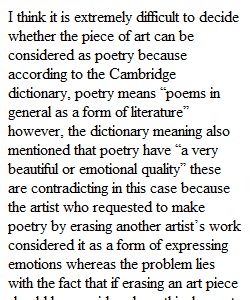


Q In 1953, a young artist named Robert Rauschenberg approached Willem de Kooning—one of the most revered artists of his day—with a strange request. He asked de Kooning for a drawing . . . so that he could erase it. Rauschenberg himself went on to be one of the greatest artists of the twentieth century. Listen to Rauschenberg's account of the story below. When Rauschenberg is asked about the Erased de Kooning Drawing, he says that it is not a protest against de Kooning and Abstract Expressionism, nor is it a work of destruction/vandalism, but rather "poetry." If we take Rauschenberg's assessment at face value, and understand the work as a poetic statement, where does the poetic dimension lie? Keep in mind, of course, that the word "poetry" can be construed quite broadly. Also keep in mind that you may need to expand your frame of reference in order to include this work in the category of "art," as many of us are accustomed to seeing things like Michelangelo's David as works of art, partly because they took a certain kind of skill to create. But the fact is that this piece is very much considered a work of art. And by accepting this, we can then move to the next level of asking ourselves, What were the new ground-rules of art at that moment, at least as they were being defined by Rauschenberg? In other words, however we may personally feel about his gesture, how do we look at this situation like inquisitive historians/scientists/lovers of all kinds of art? How do we make sense of this rather noticeable shift in artistic practice historically? What is the real work of the artist here, as compared with more traditional art? And what does this say about the nature of not only art itself, but existence? Can you think of any parallels in music or philosophy (or general cultural situations) that were occurring around the same time that Rauschenberg (and de Kooning) made this piece? Your post should be two to three (well-developed) paragraphs long. Read your classmates' posts and reply to at least one of them.
View Related Questions